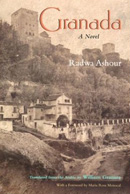
If there's one time and place I wish I could travel to, it's Moorish Spain; al-Andalus has long had a strange fascination for me, with its extraordinarily developed culture—architecture which continues to amaze us today, some of the greatest thinkers of the time, flourishing literature and music—set against the stunning backdrop of the Spanish landscape. 1492 strikes me as one of the most ambiguous dates in history—a motive for celebration over the "expulsion of the Moors" for the Castilians, or desolation and mourning at the "fall of Granada" for the Arabs.
Radwa Ashour's novel begins in Granada just days before it falls, and ends several decades later. It tells the story of the Moorish community and their attempts to come to terms with the loss of their world and to adapt to the new life imposed on them. Ashour focuses on one family, that of Abu Jaafar the bookbinder, and through their story she deftly tells us the story of a whole community.
Early in the book Saleema and Hasan, then still children, witness a joyful procession celebrating Columbus's recent "discovery" of the New World—but already there are clouds on the horizon, and the jubilation soon fades as Granada falls. Forced to convert to Catholicism to survive, the family, like others around them, strive to carry on with life as usual within the walls of their house, struggling to adhere to the rites of their Muslim faith in secret. The older members of the community die heartbroken, whilst their younger relatives try to find their own ways to survive: some quietly subversive, like Maryama; some like Hasan, who keeps out of trouble and hopes for the best; some retreating like Saleema into books and learning (a dangerous move in a society in which Arabic books are banned); and some, like Saad, opting for open rebellion as freedom fighters.
Ashour does a wonderful job of evoking a particular time and place, and the Moors' sense of loss is tangible. Granada could be read as a straightforward family saga, and it wouldn't disappoint. Yet seamlessly woven into the family story is a captivating history lesson, with historical detail introduced very naturally (for example, Hasan marries three of his daughters off to the sons of a Valencian businessman, which gives Ashour the opportunity to comment, through dialogue, on the more favourable situation of the Moors of Valencia at the time of the marriage…and then on their desperate situation a few years later). In addition to the family saga and the historical novel, I found yet another layer – I was struck by the parallels with world events today, most noticeably in relation to Saad's life as a freedom fighter.
Radwa Ashour is an Egyptian novelist, critic and professor of English literature at Ain Shams University in Cairo.
The trilogy of which Granada is the first part (the other two have yet to be translated into English) was named
Best Book of the Year by the General Egyptian Book Organisation in 1994.

Syracuse University Press, hardcover, 9780815607656
